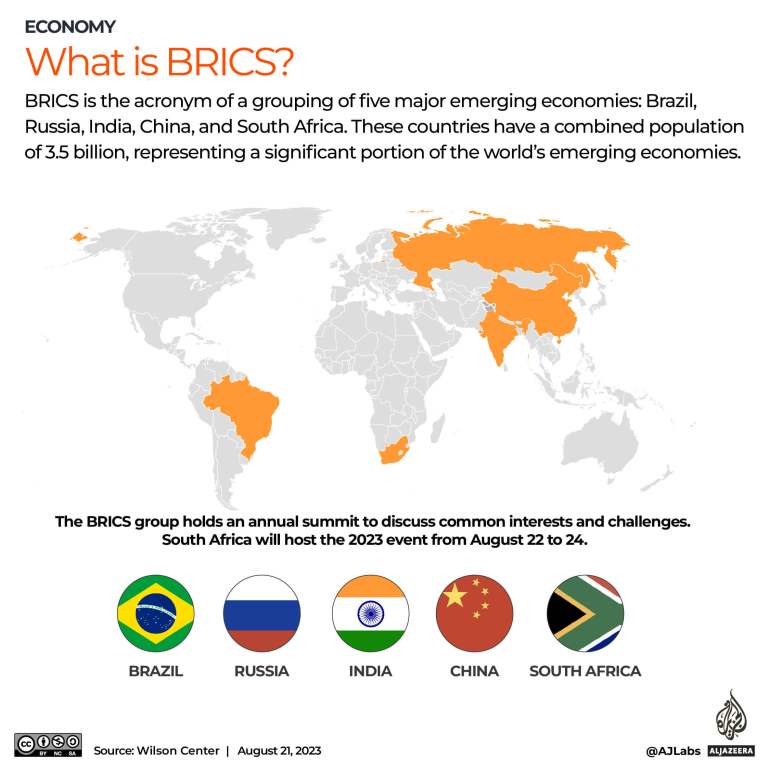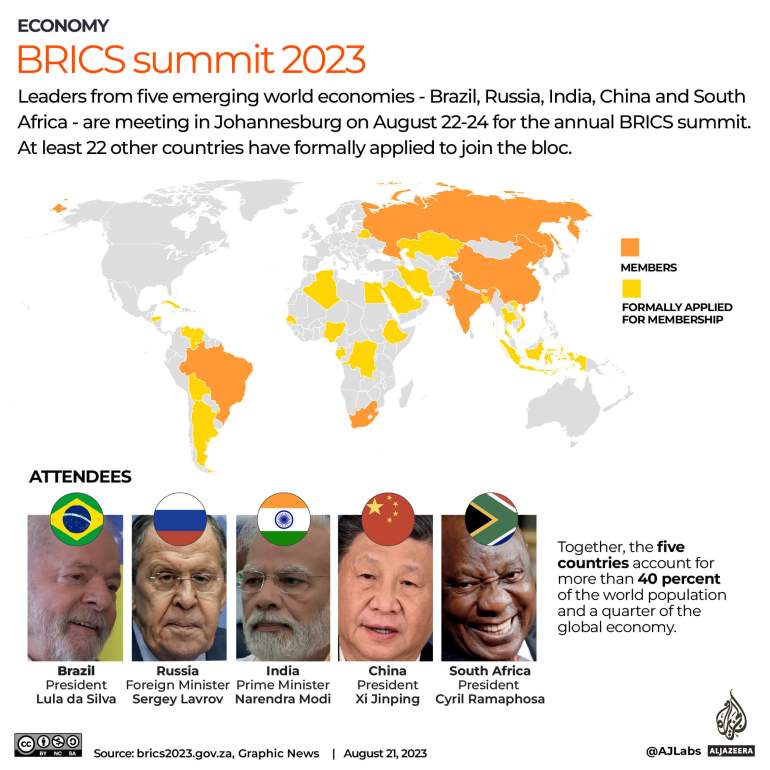The Global South, which accounts for 85 percent of the world’s population, is “on the margins and outliers in terms of global decision-making” while political and financial institutions are still dominated by a select few in the West, said Anil Sooklal, South Africa’s ambassador to the BRICS, which also includes Brazil, Russia, India and China.
“You have almost a system [akin to] apartheid South Africa where the minority decides for the majority, and that’s still the situation on the world stage today,” he told Al Jazeera before the three-day meet.
“We don’t want to be told what is right for us, we want the fault lines of the current global governance architecture to be redesigned, to be reformed, to be transformed. And we want to be part of the process to create a more equitable, a more inclusive, a multipolar global community where we have fairness and justice in terms of how we conduct ourselves.”
At the summit, BRICS leaders are expected to discuss alternative currency options to challenge dollar dominance and the possibility of expanding their grouping of five to include other countries.
But analysts say that when it comes to the specifics, the grouping could struggle to reach an agreement due to their different, and sometimes competing, interests. It is not yet clear how they plan to go about implementing the changes they seek while some experts also question whether the BRICS is the best forum to take this on.
A ‘stalled acronym’?
The moniker BRIC first entered the mainstream in 2001, when former Goldman Sachs economist Jim O’Neill used it in a paper to highlight the economic potential of Brazil, Russia, India and China for future investors.
The countries formed a grouping in 2009; a year later they brought in South Africa – going from BRIC to BRICS. Thirteen years on, the BRICS countries, who make up 40 percent of the world’s population, now account for a quarter of the global economy and a fifth of global trade.

Yet many question its relevance and achievements. O’Neill recently told the Financial Times that the grouping “never achieved anything since they first started meeting”.
“[BRICS] has really just been a kind of stalled acronym,” Chris Weafer, an investment analyst with Macro-Advisory, a strategic consultancy that focuses on Russia and Eurasia, told Al Jazeera, adding that for years the group met to talk more about future intentions than practical steps.
But in the last 18 months, he has seen a change. “This is probably the first serious meeting; the first meeting where issues of making BRICS into a more effective organisation will be addressed,” he said.
“I think there is now much more serious effort on the part of the countries to make BRICS into something kind of more substantial and to make it into a group that can actually cooperate between each other and can represent the interests of each other.”
Key issues
South African President Cyril Ramaphosa, Chinese President Xi Jinping, Brazil’s President Luiz Inacio Lula da Silva and Indian Prime Minister Narendra Modi are attending in person, while Russia’s Vladimir Putin will make a virtual appearance.
The International Criminal Court has issued an arrest warrant against Putin related to Russia’s ongoing war in Ukraine. South Africa, as a signatory to the ICC’s Rome Statute, would be obligated to detain Putin if he visits.
Weafer said Russia’s international isolation and the sanctions it faces for invading Ukraine, and separately the trade and technology sanctions imposed by the United States against China have pushed Beijing and Moscow to seek a stronger BRICS.
South Africa’s Sooklal criticised the “unilateral sanctions” the West uses “to contain countries, prevent them from rising and becoming what they see as competition to their dominance of the world”. Measures, like those taken by the US against China, are “unfortunate because no one benefits in the end”, he said.
The tensions between China and the US, in particular, are “changing everybody’s calculation”, said Danny Bradlow, a professor with the Centre for Advancement of Scholarship at the University of Pretoria. “More countries feel they have to be better positioned and have more options than they did before, and the BRICS seems like one possibility because of who’s involved in it.”
More than 40 leaders from emerging economies will attend meetings on the margins of the summit this year. Many, including Saudi Arabia, Iran, Argentina, Indonesia and Egypt, have expressed interest in joining the bloc.
But BRICS members are divided on the issue of expansion. According to Bradlow, Russia, which is increasingly isolated, is fully in support of expansion; so is China, which is the leading economy in the grouping; while Brazil and India, which are keen to maintain strong relations with the West too, are more ambivalent about expansion.
Gustavo de Carvalho, a policy analyst on Russia-Africa ties, said India is the most reluctant of the five, at least in part because of its rivalry with neighbouring China, and may view expansion as a means for Beijing to increase its influence within the group.
Meanwhile, South Africa’s Ramaphosa, speaking in a televised address on Sunday, said the country supports expansion, but de Carvalho argued that as “the junior partner of BRICS”, fast expansion of the grouping “could be detrimental to its position within that”.

Another theme expected to be on the agenda is whether the grouping can move beyond a financial system dominated by the dollar.
Suggestions that the BRICS may be looking to create its own currency have been mostly dismissed by experts. Bradlow told Al Jazeera it’s “fanciful and unrealistic”, and Weafer said it’s a “non-starter”. O’Neill, in recent comments to the media, called the idea “ridiculous”. But the BRICS is expected to explore more trade in their own currencies rather than in the dollar.
The theme of this year’s summit, BRICS and Africa: Partnership for Mutually Accelerated Growth, Sustainable Development, and Inclusive Multilateralism, also focuses on Africa.
“South Africa has always championed the interests of Africa within BRICS,” Ramaphosa said on Sunday. “We want to build a partnership between BRICS and Africa so that our continent can unlock opportunities for increased trade, investment and infrastructure development.”
Successes and challenges
When BRIC first emerged, it was predicted that its member nations would lead the global economy by 2050. Whether this is on track remains to be seen, analysts say. On the one hand, China will continue to be a major global economy, and India will also grow stronger because of the sheer size of its population, Bradlow said. But at the same time, there are other countries that will surpass the weaker economies of BRICS. He also notes that issues like climate change will reshape individual economies in ways we cannot predict yet.
For Bradlow, two of BRICS’s tangible successes have been the formation of the New Development Bank, a multilateral development bank working with emerging markets, and the contingent reserve arrangement, which works as a liquidity mechanism to support BRICS countries struggling with payments.
To Sooklal, the grouping’s successes go beyond just its economic effect. “Diversity is the strength of BRICS,” he said, describing the bloc as a “powerful voice” against the “current polarised world order”.
“Take away BRICS from the world. Imagine there was no BRICS today – what would you have?” Sooklal asked. “You would have G20 and you have G7. Where do you have an entity that can galvanise the Global South?”
Bradlow said the tension within the BRICS, especially between India and China, could limit the grouping’s potential, and expanding too fast could inject further complications among members. He wondered whether the G77 in the UN system or the G24 in the IMF system might be better vehicles to amplify the Global South’s voice.
Weafer though said the BRICS may be “the best of what currently exists”.
“Look at the world, most of the big decisions are made in the interests of the Western nations. and there is a gap therefore for a group that represents the interests of developing nations,” he said. “If China, Russia, Brazil, South Africa, India all come separately, they are more easily dismissed. But if they come as BRICS, with one voice and presumably with a bigger membership of like-minded countries, then you have to listen to them.”
The summit this week is a key step in that direction, according to Sooklal.
“The only way we can get to the high table and claim our space is by elbowing our way in,” he said.
